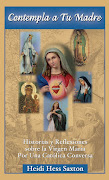In the discussion that followed her post, one woman wrote to assert that because He is God, Jesus couldn't possible love Mary more (or differently) than He loves us. She writes:
Mary, although she was a virgin, was not perfect. Extraordinary and courageous, yes. Does Jesus, who is GOD, love Mary more than me or you. I don't think it is possible...that is just our human way of approaching it.
I quote her here not to embarrass her, but to point out the difficulty in her reasoning because so many Christians have arrived at similar conclusions. Part of her difficulty, of course, lies in what appears to be a faulty understanding of the person and nature of Christ. Yes, Jesus is God. He is also man -- that is, He has both human AND divine natures, now as then, in His one divine person. Therefore, He honors both His Father and mother, as the commandments demand. ("Honor thy father and mother".)
One of the most important reasons the Church has always honored Mary, even before she was declared "Theotokos: the Mother of God" at the Council of Ephesus in the early 5th century, stems from the development of the Christological and Trinitarian dogmas of that time period. It is for this reason that we speak of the Trinity, even though it is not contained in any Scripture.
Yet the Church did in fact declare her "Mother of God." This does not mean that she is by nature divine -- she is as human as the rest of us, though kept pure by the power of God so that she would be fit to bear the sinless Son of God. Like most mothers', her task was largely a hidden one -- then as now. She does not take any glory for herself, but draws us close to her in order to lead us closer to Jesus. From the beginning she was understood to be the firstfruit of her Son's redemptive work, the model of all Christians, and the spiritual mother of the Church.
Christ predicted that the gates of hell would not prevail against His Church. He did not leave behind a book, but a group of men to guide the Church. Scripture does not say, "I will build my Church to guide you until such time that you can read the Bible for yourselves."
But why should we ask the saints in heaven to pray for us? Isn't that like attempting to communicate with the dead -- something that was clearly condemned in the Old Testament? In John 15, Jesus describes the nature of the communion of saints, a connection that is not broken in death.
"I am the vine, you are the branches. Abide in Me, and I in you. As the branch cannot bear fruit of itself, unless it abides in the vine, neither can you, unless you abide in Me. I am the vine, you are the branches. He who abides in Me, and I in him, bears much fruit; for without Me you can do nothing. If anyone does not abide in Me, he is cast out as a branch and is withered; and they gather them and throw them into the fire, and they are burned. If you abide in Me, and My words abide in you, you will ask what you desire, and it shall be done for you."
Nowhere does it say, "if you remain in me as long as you are on earth," or "you shall bear fruit as long as you are on earth." So long as we remain in Christ, we remain connected to all our mothers and fathers and brothers and sisters in faith.
P.S. When Jesus came to us in the Incarnation, He used the sensible world to draw us into relationship with Himself. Through the sacraments, He does this for us today just as He did two thousand years ago. Today at Catholic Exchange, my article "Tender Mercies" touches upon this incarnational aspect of grace. If you are struggling with a burden you don't know how to release, please read it and be reminded of the infinite Mercy that is available to all those who ask for it.
God bless you ... and Happy Easter!












 My StumbleUpon Page
My StumbleUpon Page
No comments:
Post a Comment